Management Principles: Skills, Business Context & Career Plan
VerifiedAdded on 2024/05/29
|23
|5524
|408
Report
AI Summary
This report analyses management principles and practices, focusing on management styles, leadership characteristics, communication processes, and organisational culture within Thomas Cook and TUI. It assesses personal management skills, strengths, weaknesses, and opportunities to set development objectives. The report also demonstrates managerial skills in a business context by leading and motivating a team, justifying decisions, and recommending improvements. Furthermore, it creates a career development plan, explaining how managerial and personal skills support career growth and reviewing development needs to produce a comprehensive plan. This document is available on Desklib, a platform offering a wide range of study tools and solved assignments for students.
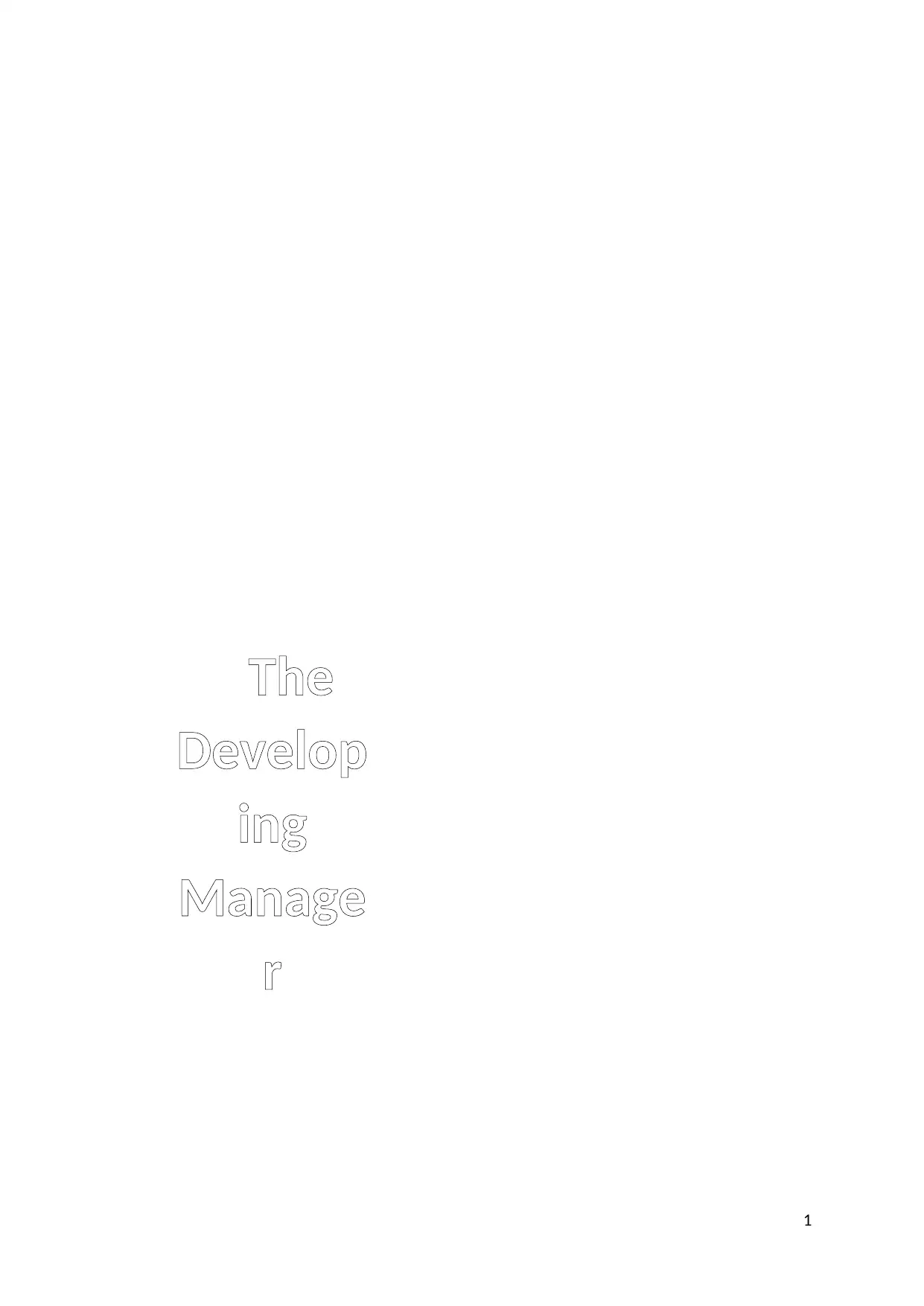
The
Develop
ing
Manage
r
1
Develop
ing
Manage
r
1
Paraphrase This Document
Need a fresh take? Get an instant paraphrase of this document with our AI Paraphraser

Table of Contents
Introduction...........................................................................................................................................3
Task 1....................................................................................................................................................4
LO1: Understand principles and practices of management behaviour...............................................4
Introduction...................................................................................................................................4
P 1.1 Compare different management styles..................................................................................5
P 1.2 Discuss leadership characteristics.........................................................................................7
P 1.3 Evaluate communication processes in selected businesses...................................................8
P 1.4 Analyse organisational culture and change in selected businesses........................................9
Conclusion...................................................................................................................................10
Task 2..................................................................................................................................................10
LO2: Be able to review own potential as a prospective manager.....................................................10
Introduction.................................................................................................................................10
P 2.1 Assess own management skills performance......................................................................11
P 2.2 Analyse personal strengths, weaknesses, opportunities and threats....................................12
P 2.3 Set and prioritise objectives and targets to develop own potential......................................14
Conclusion...................................................................................................................................14
Task 3..................................................................................................................................................15
LO3: Be able to show managerial skills within a business and services context..............................15
Introduction.................................................................................................................................15
P 3.1 Lead and motivate a team to achieve an agreed goal or objective......................................16
P 3.2 Justify managerial decisions made to support achievement of agreed goal or objective and
recommendations for improvements............................................................................................17
Conclusion...................................................................................................................................18
Task 4..................................................................................................................................................18
LO4: Be able to create a career development plan for employment within a business and services
context.............................................................................................................................................18
2
Introduction...........................................................................................................................................3
Task 1....................................................................................................................................................4
LO1: Understand principles and practices of management behaviour...............................................4
Introduction...................................................................................................................................4
P 1.1 Compare different management styles..................................................................................5
P 1.2 Discuss leadership characteristics.........................................................................................7
P 1.3 Evaluate communication processes in selected businesses...................................................8
P 1.4 Analyse organisational culture and change in selected businesses........................................9
Conclusion...................................................................................................................................10
Task 2..................................................................................................................................................10
LO2: Be able to review own potential as a prospective manager.....................................................10
Introduction.................................................................................................................................10
P 2.1 Assess own management skills performance......................................................................11
P 2.2 Analyse personal strengths, weaknesses, opportunities and threats....................................12
P 2.3 Set and prioritise objectives and targets to develop own potential......................................14
Conclusion...................................................................................................................................14
Task 3..................................................................................................................................................15
LO3: Be able to show managerial skills within a business and services context..............................15
Introduction.................................................................................................................................15
P 3.1 Lead and motivate a team to achieve an agreed goal or objective......................................16
P 3.2 Justify managerial decisions made to support achievement of agreed goal or objective and
recommendations for improvements............................................................................................17
Conclusion...................................................................................................................................18
Task 4..................................................................................................................................................18
LO4: Be able to create a career development plan for employment within a business and services
context.............................................................................................................................................18
2

Introduction.................................................................................................................................18
P4.1 Explain how own managerial and personal skills will support career development.............18
P 4.2 Review career and personal development needs, current performance and future needs to
produce development plan...........................................................................................................19
Conclusion...................................................................................................................................20
Conclusion...........................................................................................................................................21
References...........................................................................................................................................22
Introduction
In today’s competitive world, the development of managers as well as employees of the
organisation is very important for the success of the business. With the increasing
competition, the managers also need to develop professionally as well as personally in order
to cope with the changes occurring in the environment. The following assignment will
compare the various management styles used by the managers of the two hospitality
organisations i.e. Thomas Cook and TUI, both the leading tour operators of UK. We will also
discuss the various leadership characteristics and the organisational culture within these two
organisations. Various managerial skills will be discussed and we will produce a future
development plan for the individual in the end of the assignment.
3
P4.1 Explain how own managerial and personal skills will support career development.............18
P 4.2 Review career and personal development needs, current performance and future needs to
produce development plan...........................................................................................................19
Conclusion...................................................................................................................................20
Conclusion...........................................................................................................................................21
References...........................................................................................................................................22
Introduction
In today’s competitive world, the development of managers as well as employees of the
organisation is very important for the success of the business. With the increasing
competition, the managers also need to develop professionally as well as personally in order
to cope with the changes occurring in the environment. The following assignment will
compare the various management styles used by the managers of the two hospitality
organisations i.e. Thomas Cook and TUI, both the leading tour operators of UK. We will also
discuss the various leadership characteristics and the organisational culture within these two
organisations. Various managerial skills will be discussed and we will produce a future
development plan for the individual in the end of the assignment.
3
⊘ This is a preview!⊘
Do you want full access?
Subscribe today to unlock all pages.

Trusted by 1+ million students worldwide
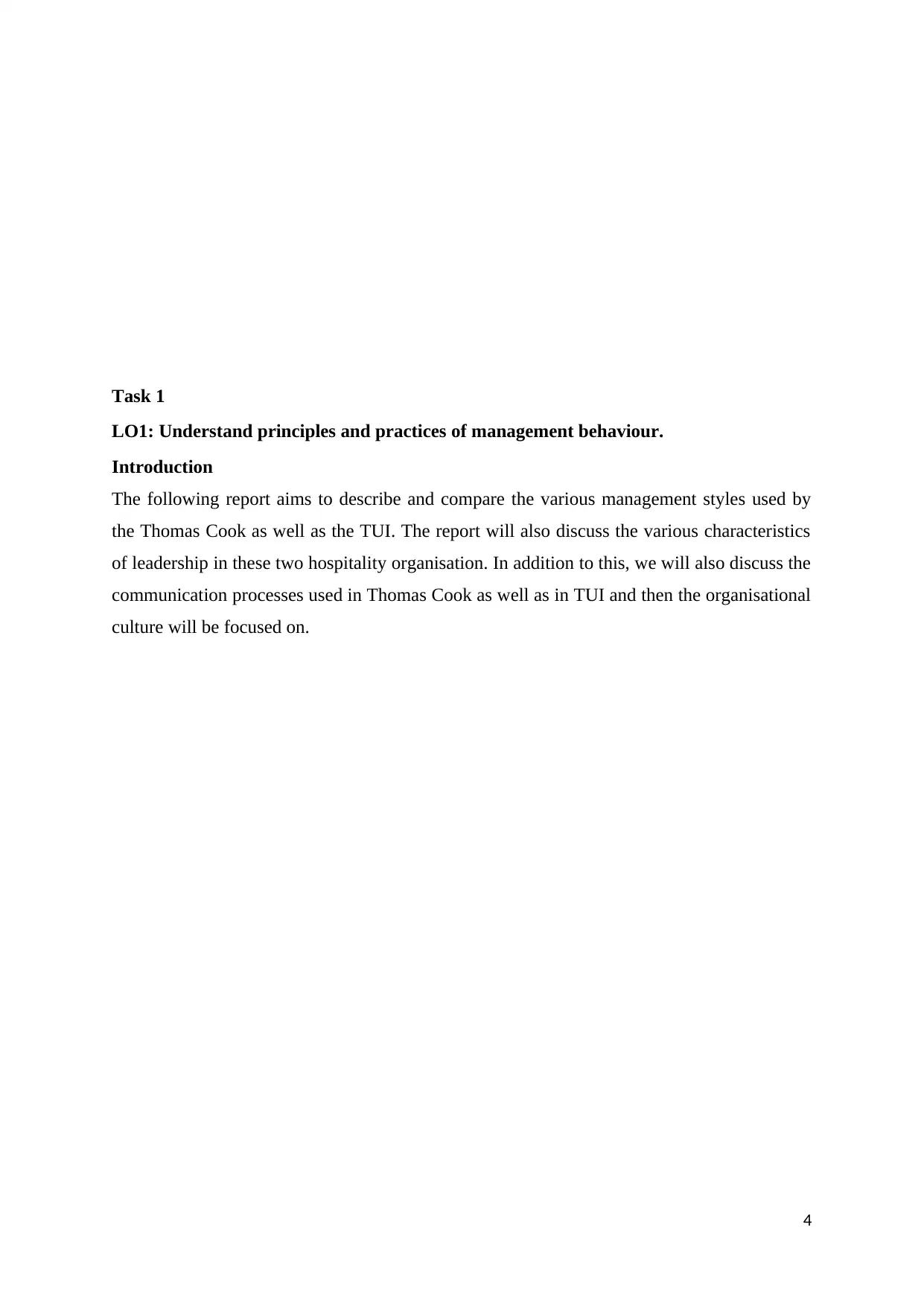
Task 1
LO1: Understand principles and practices of management behaviour.
Introduction
The following report aims to describe and compare the various management styles used by
the Thomas Cook as well as the TUI. The report will also discuss the various characteristics
of leadership in these two hospitality organisation. In addition to this, we will also discuss the
communication processes used in Thomas Cook as well as in TUI and then the organisational
culture will be focused on.
4
LO1: Understand principles and practices of management behaviour.
Introduction
The following report aims to describe and compare the various management styles used by
the Thomas Cook as well as the TUI. The report will also discuss the various characteristics
of leadership in these two hospitality organisation. In addition to this, we will also discuss the
communication processes used in Thomas Cook as well as in TUI and then the organisational
culture will be focused on.
4
Paraphrase This Document
Need a fresh take? Get an instant paraphrase of this document with our AI Paraphraser
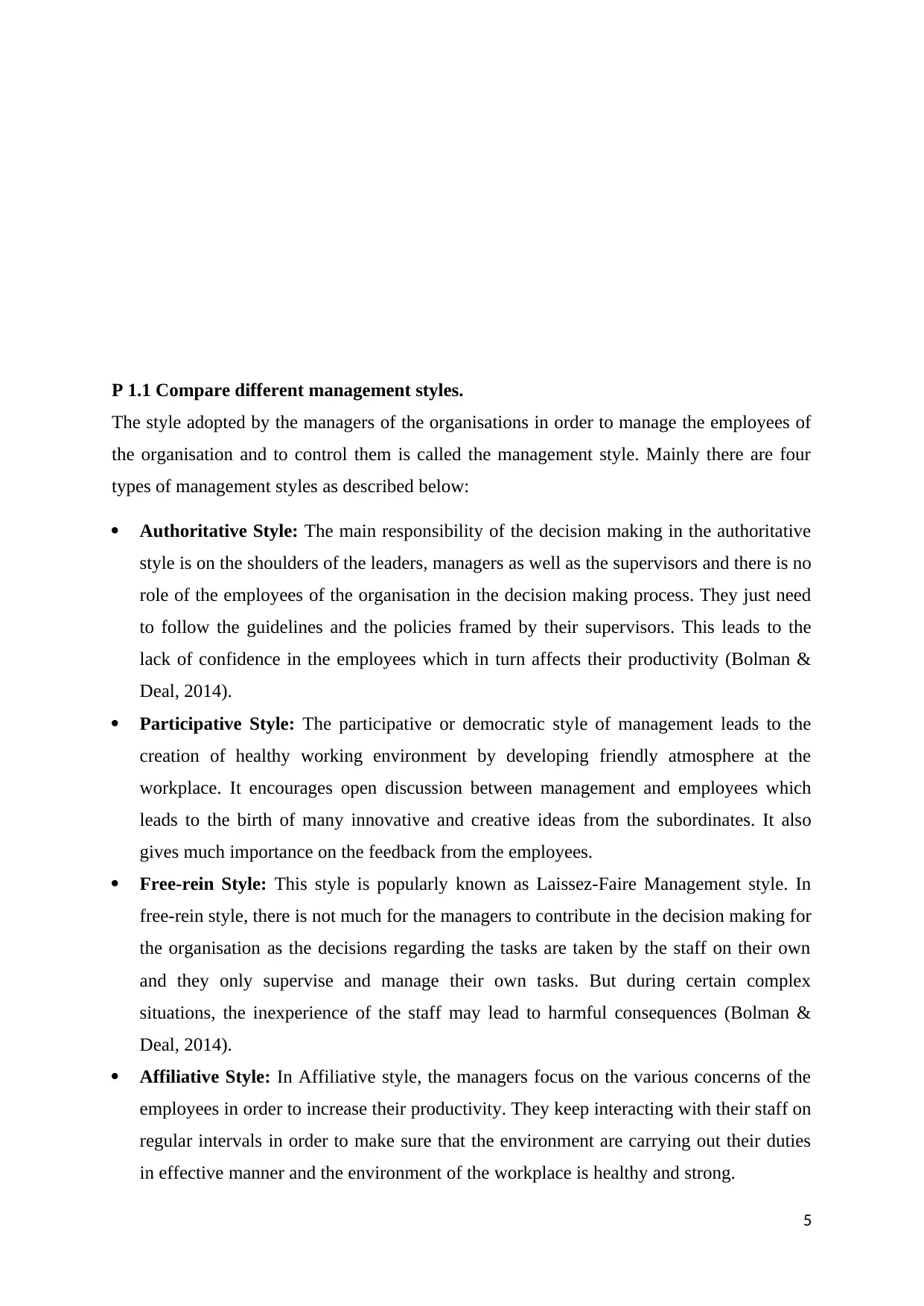
P 1.1 Compare different management styles.
The style adopted by the managers of the organisations in order to manage the employees of
the organisation and to control them is called the management style. Mainly there are four
types of management styles as described below:
Authoritative Style: The main responsibility of the decision making in the authoritative
style is on the shoulders of the leaders, managers as well as the supervisors and there is no
role of the employees of the organisation in the decision making process. They just need
to follow the guidelines and the policies framed by their supervisors. This leads to the
lack of confidence in the employees which in turn affects their productivity (Bolman &
Deal, 2014).
Participative Style: The participative or democratic style of management leads to the
creation of healthy working environment by developing friendly atmosphere at the
workplace. It encourages open discussion between management and employees which
leads to the birth of many innovative and creative ideas from the subordinates. It also
gives much importance on the feedback from the employees.
Free-rein Style: This style is popularly known as Laissez-Faire Management style. In
free-rein style, there is not much for the managers to contribute in the decision making for
the organisation as the decisions regarding the tasks are taken by the staff on their own
and they only supervise and manage their own tasks. But during certain complex
situations, the inexperience of the staff may lead to harmful consequences (Bolman &
Deal, 2014).
Affiliative Style: In Affiliative style, the managers focus on the various concerns of the
employees in order to increase their productivity. They keep interacting with their staff on
regular intervals in order to make sure that the environment are carrying out their duties
in effective manner and the environment of the workplace is healthy and strong.
5
The style adopted by the managers of the organisations in order to manage the employees of
the organisation and to control them is called the management style. Mainly there are four
types of management styles as described below:
Authoritative Style: The main responsibility of the decision making in the authoritative
style is on the shoulders of the leaders, managers as well as the supervisors and there is no
role of the employees of the organisation in the decision making process. They just need
to follow the guidelines and the policies framed by their supervisors. This leads to the
lack of confidence in the employees which in turn affects their productivity (Bolman &
Deal, 2014).
Participative Style: The participative or democratic style of management leads to the
creation of healthy working environment by developing friendly atmosphere at the
workplace. It encourages open discussion between management and employees which
leads to the birth of many innovative and creative ideas from the subordinates. It also
gives much importance on the feedback from the employees.
Free-rein Style: This style is popularly known as Laissez-Faire Management style. In
free-rein style, there is not much for the managers to contribute in the decision making for
the organisation as the decisions regarding the tasks are taken by the staff on their own
and they only supervise and manage their own tasks. But during certain complex
situations, the inexperience of the staff may lead to harmful consequences (Bolman &
Deal, 2014).
Affiliative Style: In Affiliative style, the managers focus on the various concerns of the
employees in order to increase their productivity. They keep interacting with their staff on
regular intervals in order to make sure that the environment are carrying out their duties
in effective manner and the environment of the workplace is healthy and strong.
5
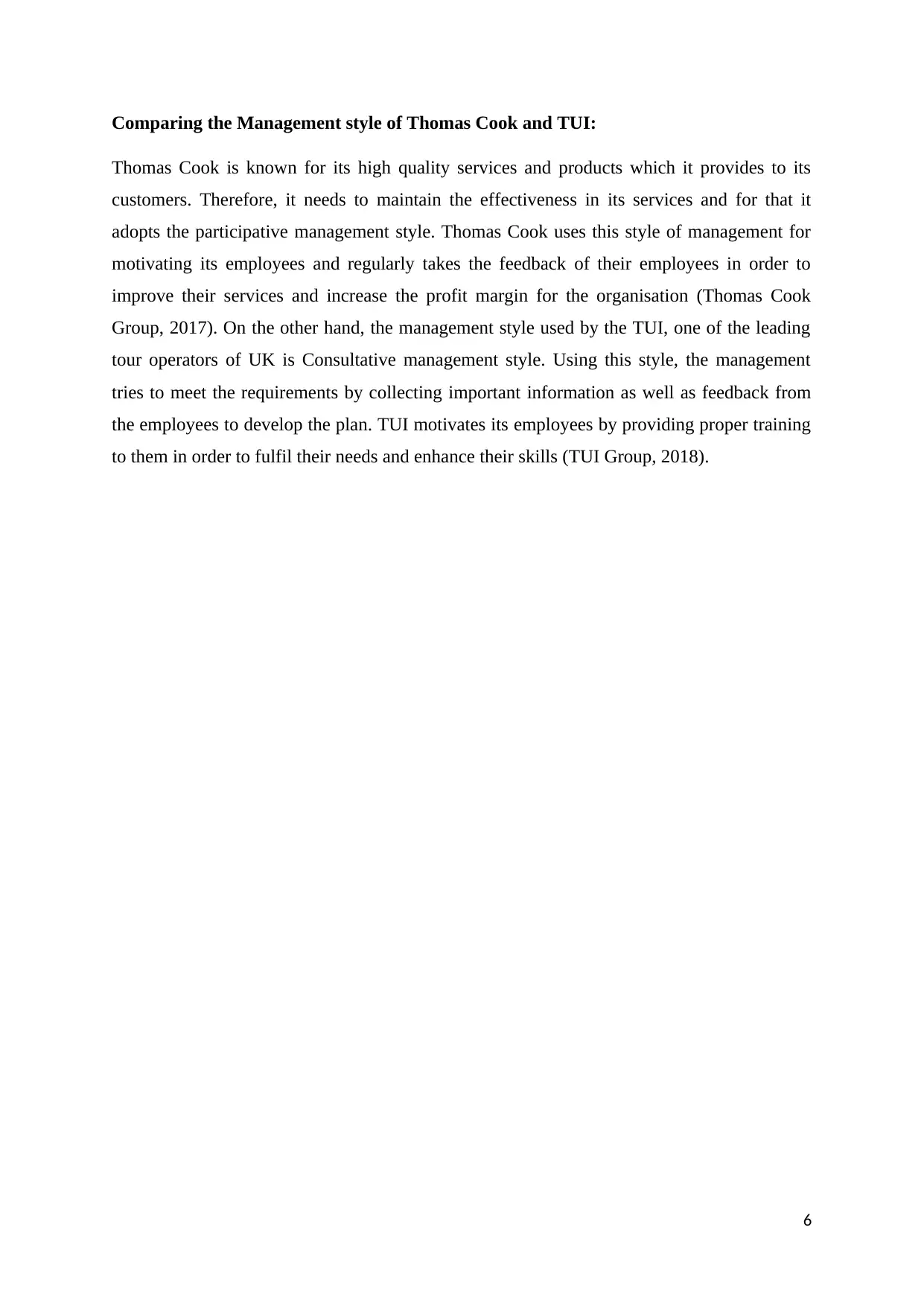
Comparing the Management style of Thomas Cook and TUI:
Thomas Cook is known for its high quality services and products which it provides to its
customers. Therefore, it needs to maintain the effectiveness in its services and for that it
adopts the participative management style. Thomas Cook uses this style of management for
motivating its employees and regularly takes the feedback of their employees in order to
improve their services and increase the profit margin for the organisation (Thomas Cook
Group, 2017). On the other hand, the management style used by the TUI, one of the leading
tour operators of UK is Consultative management style. Using this style, the management
tries to meet the requirements by collecting important information as well as feedback from
the employees to develop the plan. TUI motivates its employees by providing proper training
to them in order to fulfil their needs and enhance their skills (TUI Group, 2018).
6
Thomas Cook is known for its high quality services and products which it provides to its
customers. Therefore, it needs to maintain the effectiveness in its services and for that it
adopts the participative management style. Thomas Cook uses this style of management for
motivating its employees and regularly takes the feedback of their employees in order to
improve their services and increase the profit margin for the organisation (Thomas Cook
Group, 2017). On the other hand, the management style used by the TUI, one of the leading
tour operators of UK is Consultative management style. Using this style, the management
tries to meet the requirements by collecting important information as well as feedback from
the employees to develop the plan. TUI motivates its employees by providing proper training
to them in order to fulfil their needs and enhance their skills (TUI Group, 2018).
6
⊘ This is a preview!⊘
Do you want full access?
Subscribe today to unlock all pages.

Trusted by 1+ million students worldwide
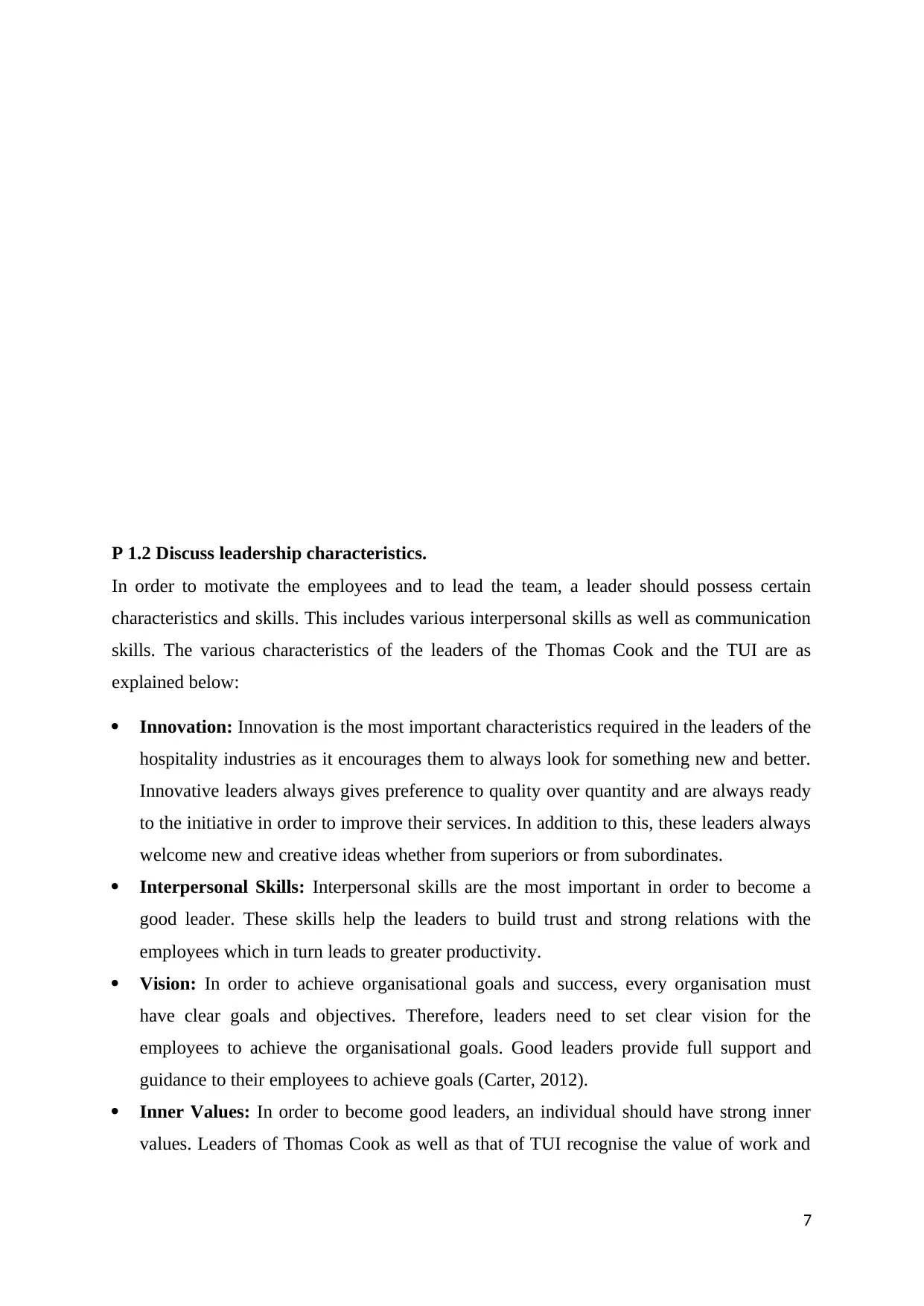
P 1.2 Discuss leadership characteristics.
In order to motivate the employees and to lead the team, a leader should possess certain
characteristics and skills. This includes various interpersonal skills as well as communication
skills. The various characteristics of the leaders of the Thomas Cook and the TUI are as
explained below:
Innovation: Innovation is the most important characteristics required in the leaders of the
hospitality industries as it encourages them to always look for something new and better.
Innovative leaders always gives preference to quality over quantity and are always ready
to the initiative in order to improve their services. In addition to this, these leaders always
welcome new and creative ideas whether from superiors or from subordinates.
Interpersonal Skills: Interpersonal skills are the most important in order to become a
good leader. These skills help the leaders to build trust and strong relations with the
employees which in turn leads to greater productivity.
Vision: In order to achieve organisational goals and success, every organisation must
have clear goals and objectives. Therefore, leaders need to set clear vision for the
employees to achieve the organisational goals. Good leaders provide full support and
guidance to their employees to achieve goals (Carter, 2012).
Inner Values: In order to become good leaders, an individual should have strong inner
values. Leaders of Thomas Cook as well as that of TUI recognise the value of work and
7
In order to motivate the employees and to lead the team, a leader should possess certain
characteristics and skills. This includes various interpersonal skills as well as communication
skills. The various characteristics of the leaders of the Thomas Cook and the TUI are as
explained below:
Innovation: Innovation is the most important characteristics required in the leaders of the
hospitality industries as it encourages them to always look for something new and better.
Innovative leaders always gives preference to quality over quantity and are always ready
to the initiative in order to improve their services. In addition to this, these leaders always
welcome new and creative ideas whether from superiors or from subordinates.
Interpersonal Skills: Interpersonal skills are the most important in order to become a
good leader. These skills help the leaders to build trust and strong relations with the
employees which in turn leads to greater productivity.
Vision: In order to achieve organisational goals and success, every organisation must
have clear goals and objectives. Therefore, leaders need to set clear vision for the
employees to achieve the organisational goals. Good leaders provide full support and
guidance to their employees to achieve goals (Carter, 2012).
Inner Values: In order to become good leaders, an individual should have strong inner
values. Leaders of Thomas Cook as well as that of TUI recognise the value of work and
7
Paraphrase This Document
Need a fresh take? Get an instant paraphrase of this document with our AI Paraphraser
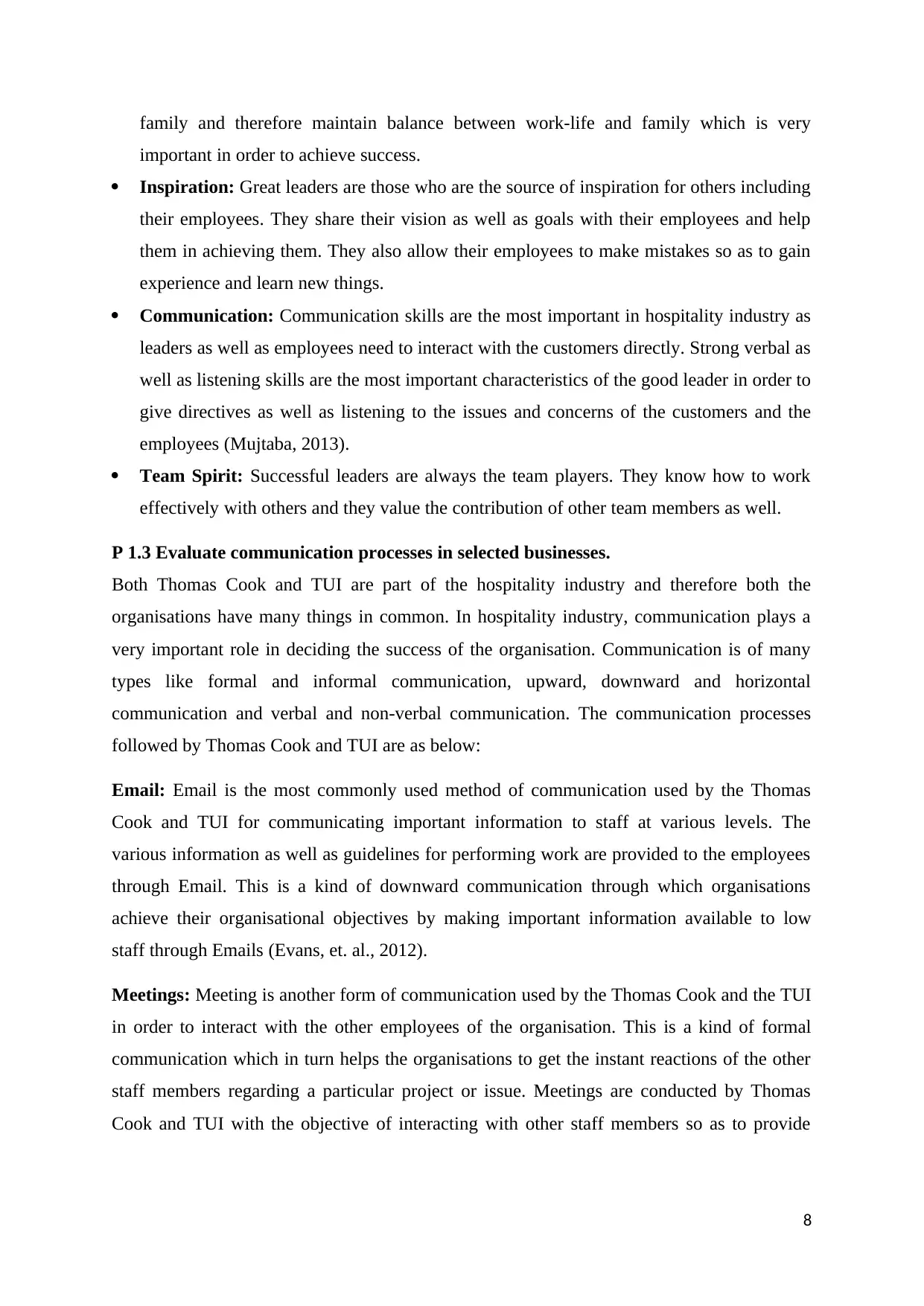
family and therefore maintain balance between work-life and family which is very
important in order to achieve success.
Inspiration: Great leaders are those who are the source of inspiration for others including
their employees. They share their vision as well as goals with their employees and help
them in achieving them. They also allow their employees to make mistakes so as to gain
experience and learn new things.
Communication: Communication skills are the most important in hospitality industry as
leaders as well as employees need to interact with the customers directly. Strong verbal as
well as listening skills are the most important characteristics of the good leader in order to
give directives as well as listening to the issues and concerns of the customers and the
employees (Mujtaba, 2013).
Team Spirit: Successful leaders are always the team players. They know how to work
effectively with others and they value the contribution of other team members as well.
P 1.3 Evaluate communication processes in selected businesses.
Both Thomas Cook and TUI are part of the hospitality industry and therefore both the
organisations have many things in common. In hospitality industry, communication plays a
very important role in deciding the success of the organisation. Communication is of many
types like formal and informal communication, upward, downward and horizontal
communication and verbal and non-verbal communication. The communication processes
followed by Thomas Cook and TUI are as below:
Email: Email is the most commonly used method of communication used by the Thomas
Cook and TUI for communicating important information to staff at various levels. The
various information as well as guidelines for performing work are provided to the employees
through Email. This is a kind of downward communication through which organisations
achieve their organisational objectives by making important information available to low
staff through Emails (Evans, et. al., 2012).
Meetings: Meeting is another form of communication used by the Thomas Cook and the TUI
in order to interact with the other employees of the organisation. This is a kind of formal
communication which in turn helps the organisations to get the instant reactions of the other
staff members regarding a particular project or issue. Meetings are conducted by Thomas
Cook and TUI with the objective of interacting with other staff members so as to provide
8
important in order to achieve success.
Inspiration: Great leaders are those who are the source of inspiration for others including
their employees. They share their vision as well as goals with their employees and help
them in achieving them. They also allow their employees to make mistakes so as to gain
experience and learn new things.
Communication: Communication skills are the most important in hospitality industry as
leaders as well as employees need to interact with the customers directly. Strong verbal as
well as listening skills are the most important characteristics of the good leader in order to
give directives as well as listening to the issues and concerns of the customers and the
employees (Mujtaba, 2013).
Team Spirit: Successful leaders are always the team players. They know how to work
effectively with others and they value the contribution of other team members as well.
P 1.3 Evaluate communication processes in selected businesses.
Both Thomas Cook and TUI are part of the hospitality industry and therefore both the
organisations have many things in common. In hospitality industry, communication plays a
very important role in deciding the success of the organisation. Communication is of many
types like formal and informal communication, upward, downward and horizontal
communication and verbal and non-verbal communication. The communication processes
followed by Thomas Cook and TUI are as below:
Email: Email is the most commonly used method of communication used by the Thomas
Cook and TUI for communicating important information to staff at various levels. The
various information as well as guidelines for performing work are provided to the employees
through Email. This is a kind of downward communication through which organisations
achieve their organisational objectives by making important information available to low
staff through Emails (Evans, et. al., 2012).
Meetings: Meeting is another form of communication used by the Thomas Cook and the TUI
in order to interact with the other employees of the organisation. This is a kind of formal
communication which in turn helps the organisations to get the instant reactions of the other
staff members regarding a particular project or issue. Meetings are conducted by Thomas
Cook and TUI with the objective of interacting with other staff members so as to provide
8
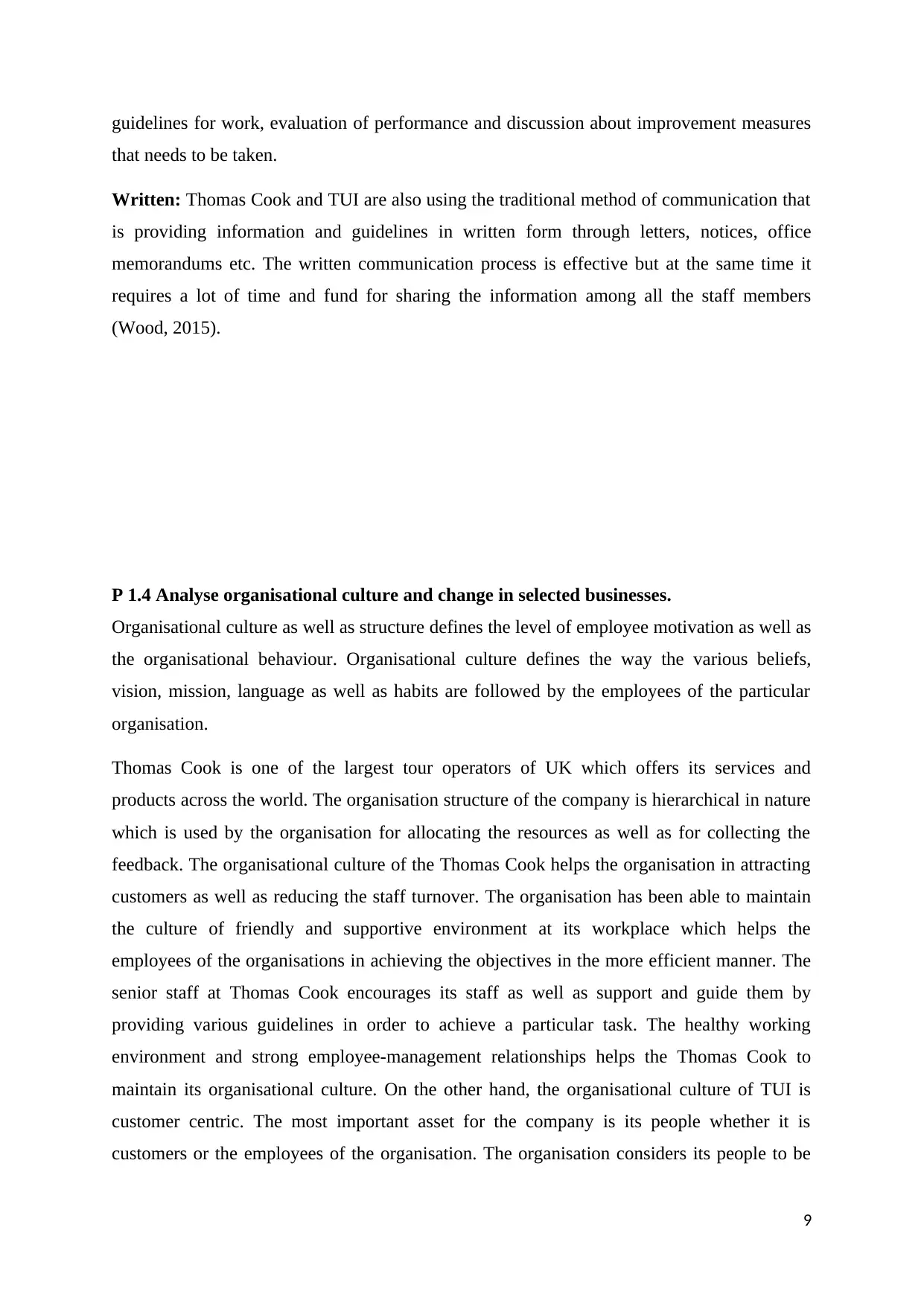
guidelines for work, evaluation of performance and discussion about improvement measures
that needs to be taken.
Written: Thomas Cook and TUI are also using the traditional method of communication that
is providing information and guidelines in written form through letters, notices, office
memorandums etc. The written communication process is effective but at the same time it
requires a lot of time and fund for sharing the information among all the staff members
(Wood, 2015).
P 1.4 Analyse organisational culture and change in selected businesses.
Organisational culture as well as structure defines the level of employee motivation as well as
the organisational behaviour. Organisational culture defines the way the various beliefs,
vision, mission, language as well as habits are followed by the employees of the particular
organisation.
Thomas Cook is one of the largest tour operators of UK which offers its services and
products across the world. The organisation structure of the company is hierarchical in nature
which is used by the organisation for allocating the resources as well as for collecting the
feedback. The organisational culture of the Thomas Cook helps the organisation in attracting
customers as well as reducing the staff turnover. The organisation has been able to maintain
the culture of friendly and supportive environment at its workplace which helps the
employees of the organisations in achieving the objectives in the more efficient manner. The
senior staff at Thomas Cook encourages its staff as well as support and guide them by
providing various guidelines in order to achieve a particular task. The healthy working
environment and strong employee-management relationships helps the Thomas Cook to
maintain its organisational culture. On the other hand, the organisational culture of TUI is
customer centric. The most important asset for the company is its people whether it is
customers or the employees of the organisation. The organisation considers its people to be
9
that needs to be taken.
Written: Thomas Cook and TUI are also using the traditional method of communication that
is providing information and guidelines in written form through letters, notices, office
memorandums etc. The written communication process is effective but at the same time it
requires a lot of time and fund for sharing the information among all the staff members
(Wood, 2015).
P 1.4 Analyse organisational culture and change in selected businesses.
Organisational culture as well as structure defines the level of employee motivation as well as
the organisational behaviour. Organisational culture defines the way the various beliefs,
vision, mission, language as well as habits are followed by the employees of the particular
organisation.
Thomas Cook is one of the largest tour operators of UK which offers its services and
products across the world. The organisation structure of the company is hierarchical in nature
which is used by the organisation for allocating the resources as well as for collecting the
feedback. The organisational culture of the Thomas Cook helps the organisation in attracting
customers as well as reducing the staff turnover. The organisation has been able to maintain
the culture of friendly and supportive environment at its workplace which helps the
employees of the organisations in achieving the objectives in the more efficient manner. The
senior staff at Thomas Cook encourages its staff as well as support and guide them by
providing various guidelines in order to achieve a particular task. The healthy working
environment and strong employee-management relationships helps the Thomas Cook to
maintain its organisational culture. On the other hand, the organisational culture of TUI is
customer centric. The most important asset for the company is its people whether it is
customers or the employees of the organisation. The organisation considers its people to be
9
⊘ This is a preview!⊘
Do you want full access?
Subscribe today to unlock all pages.

Trusted by 1+ million students worldwide
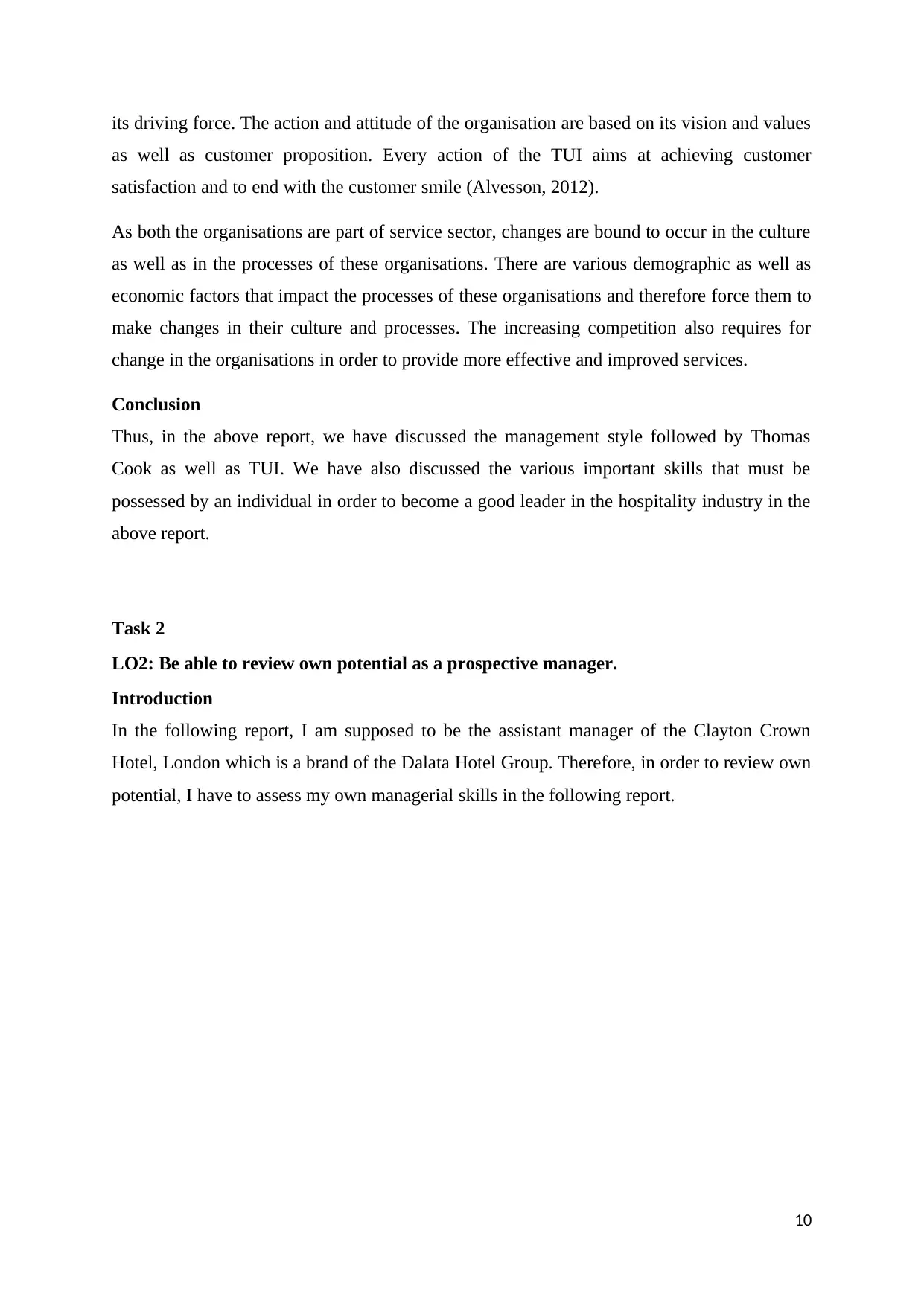
its driving force. The action and attitude of the organisation are based on its vision and values
as well as customer proposition. Every action of the TUI aims at achieving customer
satisfaction and to end with the customer smile (Alvesson, 2012).
As both the organisations are part of service sector, changes are bound to occur in the culture
as well as in the processes of these organisations. There are various demographic as well as
economic factors that impact the processes of these organisations and therefore force them to
make changes in their culture and processes. The increasing competition also requires for
change in the organisations in order to provide more effective and improved services.
Conclusion
Thus, in the above report, we have discussed the management style followed by Thomas
Cook as well as TUI. We have also discussed the various important skills that must be
possessed by an individual in order to become a good leader in the hospitality industry in the
above report.
Task 2
LO2: Be able to review own potential as a prospective manager.
Introduction
In the following report, I am supposed to be the assistant manager of the Clayton Crown
Hotel, London which is a brand of the Dalata Hotel Group. Therefore, in order to review own
potential, I have to assess my own managerial skills in the following report.
10
as well as customer proposition. Every action of the TUI aims at achieving customer
satisfaction and to end with the customer smile (Alvesson, 2012).
As both the organisations are part of service sector, changes are bound to occur in the culture
as well as in the processes of these organisations. There are various demographic as well as
economic factors that impact the processes of these organisations and therefore force them to
make changes in their culture and processes. The increasing competition also requires for
change in the organisations in order to provide more effective and improved services.
Conclusion
Thus, in the above report, we have discussed the management style followed by Thomas
Cook as well as TUI. We have also discussed the various important skills that must be
possessed by an individual in order to become a good leader in the hospitality industry in the
above report.
Task 2
LO2: Be able to review own potential as a prospective manager.
Introduction
In the following report, I am supposed to be the assistant manager of the Clayton Crown
Hotel, London which is a brand of the Dalata Hotel Group. Therefore, in order to review own
potential, I have to assess my own managerial skills in the following report.
10
Paraphrase This Document
Need a fresh take? Get an instant paraphrase of this document with our AI Paraphraser

P 2.1 Assess own management skills performance.
In order to carry out the managerial tasks in the efficient manager, a manager must possess
several skills. In order to be effective, self- evaluation is very important as it helps in
analysing the self-strengths as well as weaknesses. Therefore, I also need to conduct an
assessment of my own managerial skills which is as below:
Leadership Skills: In order to be effective, a manager needs to be a good leader and
therefore must possess effective leadership skills. I have analysed my leadership skills and
concluded that I am a good leader. Although, I have never faced any difficult situation at
workplace during my till date career, but I am able to lead others and motivate them to
perform better. I am capable of handling major responsibilities which shows that I can be a
good leader (Holten, et. al., 2015)
Personal Skills: Personal skills include interpersonal skills, motivational skills as well as
communication skills. I am a very good speaker. However, lack of patience is my weakness
and therefore I cannot consider myself a very good listener. I have very strong interpersonal
skills which make me connect myself with others very closely. This makes me a good
manager as others can easily share their issues and thoughts with me. My verbal
11
In order to carry out the managerial tasks in the efficient manager, a manager must possess
several skills. In order to be effective, self- evaluation is very important as it helps in
analysing the self-strengths as well as weaknesses. Therefore, I also need to conduct an
assessment of my own managerial skills which is as below:
Leadership Skills: In order to be effective, a manager needs to be a good leader and
therefore must possess effective leadership skills. I have analysed my leadership skills and
concluded that I am a good leader. Although, I have never faced any difficult situation at
workplace during my till date career, but I am able to lead others and motivate them to
perform better. I am capable of handling major responsibilities which shows that I can be a
good leader (Holten, et. al., 2015)
Personal Skills: Personal skills include interpersonal skills, motivational skills as well as
communication skills. I am a very good speaker. However, lack of patience is my weakness
and therefore I cannot consider myself a very good listener. I have very strong interpersonal
skills which make me connect myself with others very closely. This makes me a good
manager as others can easily share their issues and thoughts with me. My verbal
11
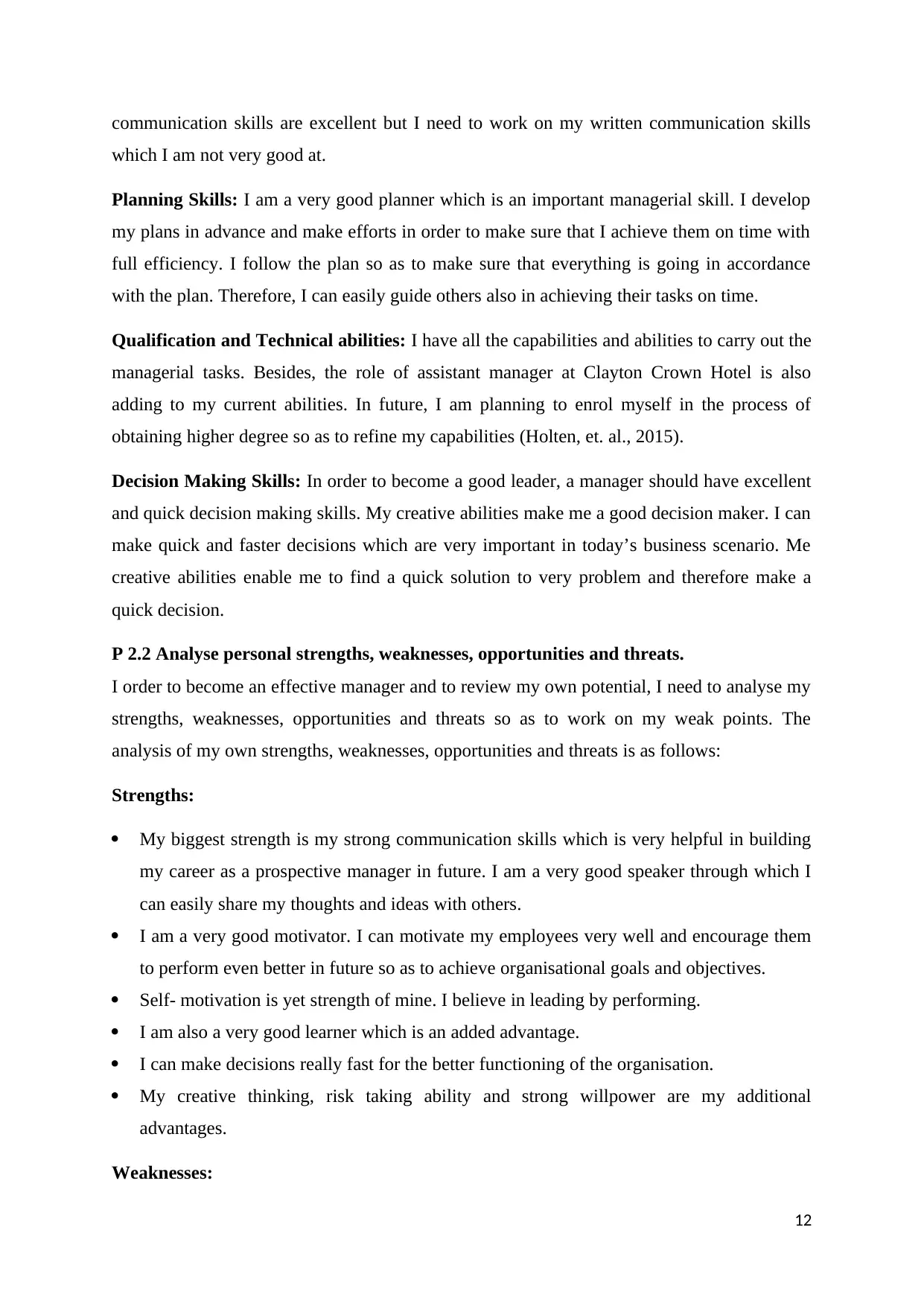
communication skills are excellent but I need to work on my written communication skills
which I am not very good at.
Planning Skills: I am a very good planner which is an important managerial skill. I develop
my plans in advance and make efforts in order to make sure that I achieve them on time with
full efficiency. I follow the plan so as to make sure that everything is going in accordance
with the plan. Therefore, I can easily guide others also in achieving their tasks on time.
Qualification and Technical abilities: I have all the capabilities and abilities to carry out the
managerial tasks. Besides, the role of assistant manager at Clayton Crown Hotel is also
adding to my current abilities. In future, I am planning to enrol myself in the process of
obtaining higher degree so as to refine my capabilities (Holten, et. al., 2015).
Decision Making Skills: In order to become a good leader, a manager should have excellent
and quick decision making skills. My creative abilities make me a good decision maker. I can
make quick and faster decisions which are very important in today’s business scenario. Me
creative abilities enable me to find a quick solution to very problem and therefore make a
quick decision.
P 2.2 Analyse personal strengths, weaknesses, opportunities and threats.
I order to become an effective manager and to review my own potential, I need to analyse my
strengths, weaknesses, opportunities and threats so as to work on my weak points. The
analysis of my own strengths, weaknesses, opportunities and threats is as follows:
Strengths:
My biggest strength is my strong communication skills which is very helpful in building
my career as a prospective manager in future. I am a very good speaker through which I
can easily share my thoughts and ideas with others.
I am a very good motivator. I can motivate my employees very well and encourage them
to perform even better in future so as to achieve organisational goals and objectives.
Self- motivation is yet strength of mine. I believe in leading by performing.
I am also a very good learner which is an added advantage.
I can make decisions really fast for the better functioning of the organisation.
My creative thinking, risk taking ability and strong willpower are my additional
advantages.
Weaknesses:
12
which I am not very good at.
Planning Skills: I am a very good planner which is an important managerial skill. I develop
my plans in advance and make efforts in order to make sure that I achieve them on time with
full efficiency. I follow the plan so as to make sure that everything is going in accordance
with the plan. Therefore, I can easily guide others also in achieving their tasks on time.
Qualification and Technical abilities: I have all the capabilities and abilities to carry out the
managerial tasks. Besides, the role of assistant manager at Clayton Crown Hotel is also
adding to my current abilities. In future, I am planning to enrol myself in the process of
obtaining higher degree so as to refine my capabilities (Holten, et. al., 2015).
Decision Making Skills: In order to become a good leader, a manager should have excellent
and quick decision making skills. My creative abilities make me a good decision maker. I can
make quick and faster decisions which are very important in today’s business scenario. Me
creative abilities enable me to find a quick solution to very problem and therefore make a
quick decision.
P 2.2 Analyse personal strengths, weaknesses, opportunities and threats.
I order to become an effective manager and to review my own potential, I need to analyse my
strengths, weaknesses, opportunities and threats so as to work on my weak points. The
analysis of my own strengths, weaknesses, opportunities and threats is as follows:
Strengths:
My biggest strength is my strong communication skills which is very helpful in building
my career as a prospective manager in future. I am a very good speaker through which I
can easily share my thoughts and ideas with others.
I am a very good motivator. I can motivate my employees very well and encourage them
to perform even better in future so as to achieve organisational goals and objectives.
Self- motivation is yet strength of mine. I believe in leading by performing.
I am also a very good learner which is an added advantage.
I can make decisions really fast for the better functioning of the organisation.
My creative thinking, risk taking ability and strong willpower are my additional
advantages.
Weaknesses:
12
⊘ This is a preview!⊘
Do you want full access?
Subscribe today to unlock all pages.

Trusted by 1+ million students worldwide
1 out of 23
Related Documents
Your All-in-One AI-Powered Toolkit for Academic Success.
+13062052269
info@desklib.com
Available 24*7 on WhatsApp / Email
![[object Object]](/_next/static/media/star-bottom.7253800d.svg)
Unlock your academic potential
Copyright © 2020–2026 A2Z Services. All Rights Reserved. Developed and managed by ZUCOL.




